As a little child I thought that baptism was almost as good as going swimming. As an eight year old I looked forward to being baptized. Getting into the water was fun. I do not remember if I tried to swim, but I have seen little children who were to be baptized start kicking in the water. They wanted to swim! But when Jesus came for baptism, He did not come to swim in the water. He did not kick in the water, dive in it, or swim beneath. He had a serious reason for being baptized – a divine reason. The gospels of Matthew, Mark, and Luke record His baptism, but only Matthew tells us why He was baptized. Why was He baptized? That is the purpose of this study.
Coming to Be Baptized
The baptism of Jesus Christ is recorded in Matthew 3:13-17, Mark 1:9-11, and Luke 3:21-22. Matthew tells us the most. As we saw in our last study, John the Baptist had been ministering near the northwest corner of the Dead Sea and near the Jordan River. Jesus was not with John. John was ministering by himself. Sometimes God calls us to minister by ourselves – all alone. Did John feel alone? He was the voice crying in the wilderness. No one else could do that job. He was it. God had chosen him and him alone. There were those who loved him, and there were those who hated him. Sometimes the ministry is difficult. Sometimes the ministry is just lonely. Yet John was faithful.
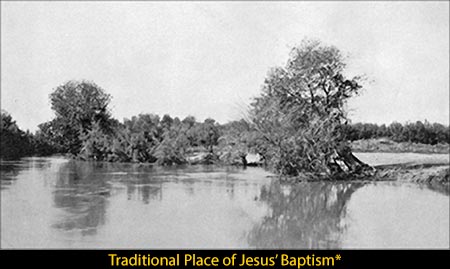
John was the forerunner for the Messiah – Jesus Christ. We do not know how long John had been preaching by himself, but one day Jesus finally came to him. The gospels of Matthew and Mark tell us that Jesus came from Nazareth in Galilee down to the Jordan River for the purpose of being baptized by John (Matthew 3:13; Mark 1:9).
Then Jesus arrived from Galilee at the Jordan coming to John, to be baptized by him. Matthew 3:13 (NASB)
In those days Jesus came from Nazareth in Galilee and was baptized by John in the Jordan. Mark 1:9 (NASB)
When Jesus arrived He waited for all of the other people to be baptized first. Then He approached John the Baptist.
Now when all the people were baptized, Jesus was also baptized . . . Luke 3:21 (NASB)
Jesus did not arrive and demand to be the center of attention. The eyes of the crowd did not turn to Him. People did not let Jesus go first. Jesus waited! This is a great lesson for us today in the “me first” culture in which we all live. Jesus waited until all the people had been baptized first. How many did He wait for? We do not know – but He waited.
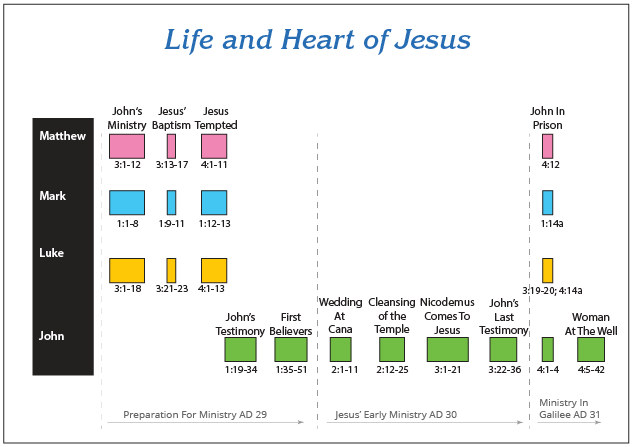
Trying To Be Baptized
After the last person was baptized, Jesus approached John and asked to be baptized. But John did not want to baptize Him.
But John tried to prevent Him, saying, “I have need to be baptized by You, and do You come to me?” Matthew 3:14 (NASB)
The Greek word translated as “prevent” means “hinder, restrain, or prohibit.” The word is in the imperfect sense which means that John repeatedly tried to stop Jesus from being baptized. We are left with the picture that John kept disagreeing with Jesus again and again.
John had rebuked the Pharisees and Sadducees (Matthew 3:7) for wanting to be baptized, because their lives were sinful and their attitudes were wrong. But John was not rejecting Jesus because His life was sinful, but because John felt that he (John) needed to be baptized by Jesus. Some have said that John said these words because he knew that Jesus was the Messiah and that Jesus was holy. But the gospel of John gives us a different picture.
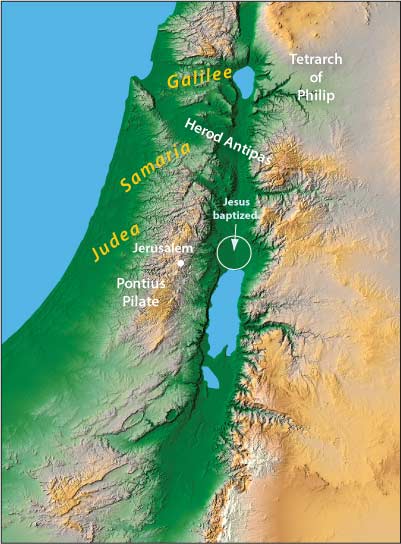
John testified saying, “I have seen the Spirit descending as a dove out of heaven, and He remained upon Him. I did not recognize Him, but He who sent me to baptize in water said to me, ‘He upon whom you see the Spirit descending and remaining upon Him, this is the One who baptizes in the Holy Spirit.'” John 1:32-33 (NASB)
This passage reveals that John the Baptist did not know that Jesus was the Messiah until after Jesus had been baptized and the Holy Spirit had descended upon Him. So – why did John say, “I have need to be baptized by You . . .”? Since John and Jesus were relatives, John most likely knew about Jesus’ life. Even though Jesus lived up in Galilee and John lived in the southern part of Israel, the family members probably passed along stories about Jesus. The event in Jerusalem with the teachers in the temple court was most likely well known by at least the Levites and priests. Jesus’ conduct as a sinless, perfect child was also probably well known within the family, among the relatives, and maybe in the community of Israel. Somehow John knew that Jesus was very unusual. Somehow John knew that Jesus was a holy man, but he might not have known that Jesus was sinless (Hebrews 4:14-15).
Fulfill All Righteousness
Finally, Jesus told John that it was necessary for John to baptize Him.
But Jesus answering said to him, “Permit it at this time; for in this way it is fitting for us to fulfill all righteousness.” Then he permitted Him. Matthew 3:15 (NASB)
Jesus explained that it was necessary “to fulfill all righteousness.” What did Jesus mean by this? Some have said that Jesus needed to be forgiven, but that contradicts the teaching of 2 Corinthians 5:21, Hebrews 4:14-15, and Hebrews 7:26 that Jesus never sinned. He was sinless. He did not need to be baptized. Others believe that Jesus had to fulfill every command in the Old Testament. However, the Bible never gives us any such clue. Some have stated that Jesus needed to be cleansed with water just like the Old Testament priests were at the beginning of their ministry. Since the Old Testament never required that of the priests, that view is incorrect.
Why did Jesus say that they needed “to fulfill all righteousness”? Notice that Jesus included John when He said, “us” in Matthew 3:15. Both of them together would “fulfill all righteousness.” The answer to our question is found when we ask the following question, “What would have happened if Jesus had ignored the forerunner?” What would have happened if the Messiah had ignored the forerunner? The answer is – then John would have really been all alone and his ministry would have been meaningless. If Jesus had ignored John, John’s baptism of repentance would have been meaningless. But there is more.
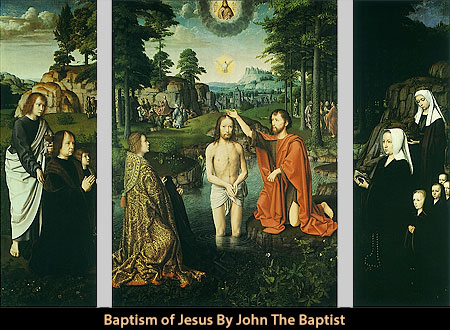
What problem would have occurred if Jesus had never been baptized by John? The answer is found once again in John 1:33 where John was told how he could recognize the Messiah.
I did not recognize Him, but He who sent me to baptize in water said to me, “He upon whom you see the Spirit descending and remaining upon Him, this is the One who baptizes in the Holy Spirit.” John 1:33 (NASB)
God had told John to look for a man upon whom the Spirit of God descended and remained. He would be the Messiah! If Jesus had never been baptized, John would have never known that Jesus was the Messiah. Jesus and John together fulfilled a promise that God had made personally to John.
By being baptized, Jesus also identified Himself with all of humanity. When Jesus died on the cross, He bore our sins. He identified Himself with our need of forgiveness and provided the solution. When Jesus was baptized by John, He also identified Himself with our need for repentance. That is what John’s baptism was all about – repentance. John’s baptism was a symbol of repentance – not salvation. Jesus’ baptism fulfilled a promise from God to John, and through it Jesus also identified Himself with our need for repentance. One day He would provide the forgiveness that the lonely repentant heart seeks.
Jesus’ Baptism.
Then John baptized Jesus.
After being baptized, Jesus came up immediately from the water . . . Matthew 3:16a (NASB)
The Greek text implies that Jesus came up out of the water. Some believe that Jesus was sprinkled as in the art depicted on the preceding page. Others say that the water was poured on Him as depicted in the artwork on this page. But the Greek seems to imply that Jesus had been submerged in the water and came up out of the water (Mark 1:10). He was immersed and then Jesus prayed.
. . . Jesus was also baptized, and while He was praying, heaven was opened . . . Luke 3:21 (NASB)
While He was praying, heaven opened and the Holy Spirit descended upon Him.
. . . and behold, the heavens were opened, and he saw the Spirit of God descending as a dove and lighting on Him, and behold, a voice out of the heavens said, “This is My beloved Son, in whom I am well-pleased.” Matthew 3:16b-17 (NASB)
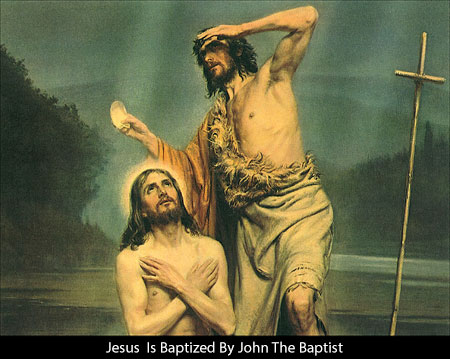
Then John the Baptist knew that Jesus was the Messiah (John 1:32-33). He did not know before that moment.
Our one God – God the Father, God the Son, and God the Holy Spirit – was present. The trinity is a mystery. That is what I would expect of God. I would expect God to be beyond my understanding, and that is exactly what John saw and what we are reading about.
Conclusion
John was no longer alone in his ministry. The forerunner had prepared the way for the Messiah. He was being faithful in His ministry. His Messiah had arrived. They were in ministry together fulfilling God’s promises. The perfect One was present. Together they called men and women to repent of their sins so that they could be forgiven. The Messiah had finally entered the pages of history. His ministry was about to start and His long march to a cross had begun.
John now knew who Jesus was and now they were in ministry together. God calls every believer to an area of ministry. No, we are not forerunners like John, but we should be “tellers of Jesus” to everyone. Sometimes that is difficult or even fearful. We can be rebuked and rejected. That happened to John as we will see in the studies ahead. Are you lonely? Then look to Jesus and pray for guidance and encouragement. The ministry is not about “you” but about “us”!
Credit Line: